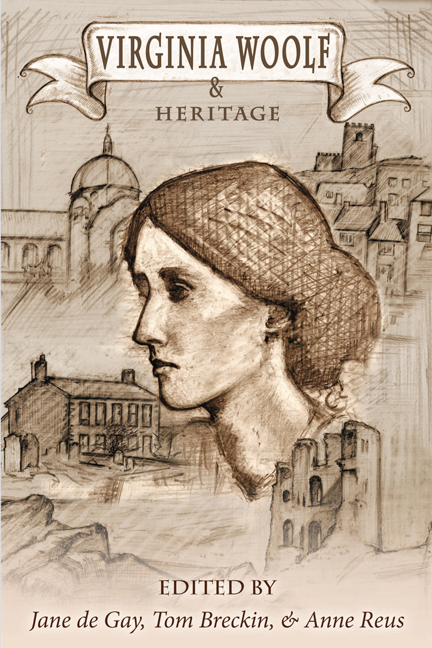Book contents
- Frontmatter
- Contents
- Introduction
- List of Abbreviations
- HERITAGE: A DEBATE
- HERITAGE, EDUCATION, AND MENTORING
- HERITAGE SPACES
- LITERARY AND CULTURAL HERITAGES
- QUEER PASTS
- MODERNISM AND HERITAGE
- Resetting the Type: An Exploration of the Historical Sense in Mrs. Dalloway
- Kenya Colony and the Kenya Novel: The East African Heritage of “A Very Fine Negress” in A Room of One's Own
- Leonard Woolf 's Fear and Politics: A Debate at the Zoo: Satirical Heritage as Apocalyptic Prophecy
- Virginia Woolf and the War on Books: Cultural Heritage and Dis-Heritage in the 1930s
- Gender Roles and the War Machine: An Undergraduate Roundtable on Virginia Woolf 's Legacies
- WRITING LIVES AND HISTORIES
- WOOLF'S LEGACIES
- FINALE
- Notes on Contributors
Kenya Colony and the Kenya Novel: The East African Heritage of “A Very Fine Negress” in A Room of One's Own
from MODERNISM AND HERITAGE
- Frontmatter
- Contents
- Introduction
- List of Abbreviations
- HERITAGE: A DEBATE
- HERITAGE, EDUCATION, AND MENTORING
- HERITAGE SPACES
- LITERARY AND CULTURAL HERITAGES
- QUEER PASTS
- MODERNISM AND HERITAGE
- Resetting the Type: An Exploration of the Historical Sense in Mrs. Dalloway
- Kenya Colony and the Kenya Novel: The East African Heritage of “A Very Fine Negress” in A Room of One's Own
- Leonard Woolf 's Fear and Politics: A Debate at the Zoo: Satirical Heritage as Apocalyptic Prophecy
- Virginia Woolf and the War on Books: Cultural Heritage and Dis-Heritage in the 1930s
- Gender Roles and the War Machine: An Undergraduate Roundtable on Virginia Woolf 's Legacies
- WRITING LIVES AND HISTORIES
- WOOLF'S LEGACIES
- FINALE
- Notes on Contributors
Summary
It is one of the great advantages of being a woman that one can pass even a very fine negress without wishing to make an Englishwoman of her.
—Virginia Woolf, A Room of One's OwnAt the time Virginia Woolf's narrator made this observation—let us say, in the late 1920s, when A Room of One's Own was published—a number of white British contemporary women writers were in fact passing by and indeed living among black women in one of Great Britain's colonies, Kenya. In this paper I look at what Woolf's narrator, and Woolf's white East African counterparts, “saw” when they passed black women. After I consider a detailed analysis of this head note by Woolf, I examine four romances by two British women whose work has been long forgotten, including Nora K. Strange and Florence Riddell, both of whom wrote what is called the “Kenya Novel.” The Kenya Novel is a subgenre of romantic fiction set in the white highlands of Britain's Crown Colony Kenya. I next make a case for how we need to be mindful of the global context of literary production; that is, of the multiple strands of discourse, including the lowbrow genre of the Kenya novel, in a globalizing world. As well as moving across space, I move across time. What legacy have writers like Riddell and Strange left? Just as A Room of One's Own has engendered a profound literary and critical heritage, including one that enjoins readers to be ever mindful of their own positions and what they think about when they think about race, these Kenya novels have left their own cultural markings. In my concluding remarks I touch upon that legacy— on the most prominent Kenya memoirs from the 1930s through the 1950s, including those by Isak Dinesen (1885–1961), Beryl Markham (1902–1986), and Elspeth Huxley (1907–1997), and finally on present-day Hollywood.
When critics address the milieus of this famous passage from A Room, they typically focus, first, on its immediate surroundings, starting with the sentences preceding it. A woman, our narrator tells us, does not have the same desire as a man to make a name for herself—to carve her name into a “tombstone or a signpost” (52)—and to dominate and acquire—to claim a dog, a woman, a piece of land, “a man with curly black hair” (52).
- Type
- Chapter
- Information
- Virginia Woolf and Heritage , pp. 162 - 167Publisher: Liverpool University PressPrint publication year: 2017



